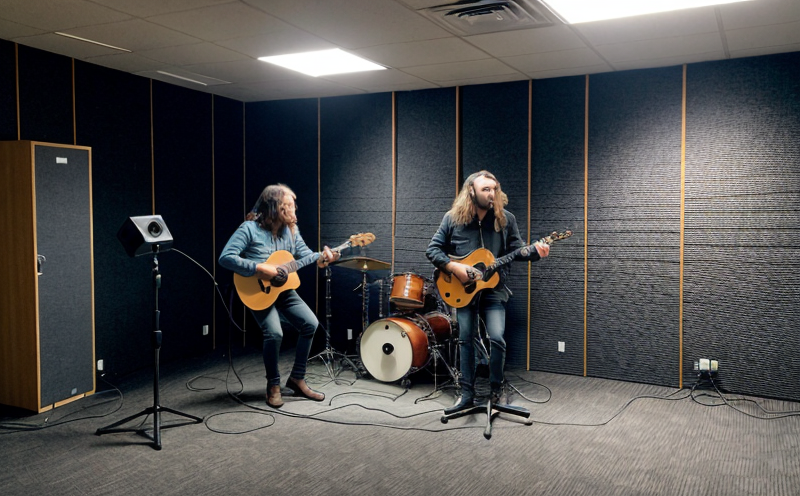EN ISO 12354-7 HVAC Acoustic Evaluation
The EN ISO 12354-7 standard provides a comprehensive framework for the acoustic evaluation of HVAC (Heating, Ventilation and Air Conditioning) equipment. This method is essential in ensuring that HVAC systems meet stringent noise control standards set by international regulations.
The standard covers various aspects including sound power level measurement, sound intensity measurements, and airborne sound transmission through barriers. The primary objective is to assess the acoustic performance of HVAC units under controlled conditions, which directly impacts their ability to operate quietly in residential, commercial, or industrial settings.
Compliance with this standard ensures that HVAC systems are not only efficient but also environmentally friendly by minimizing noise pollution. This is particularly important for equipment used in densely populated areas where the reduction of ambient sound levels is critical.
To conduct an accurate assessment, testing must be performed in a controlled environment such as a reverberation chamber or an ISO-9614-2 room. The test setup includes placing the HVAC unit at its intended operating conditions and measuring various acoustic parameters using calibrated microphones placed around the equipment.
The sound power level (Lw) is calculated by averaging the noise levels measured in different positions around the unit. Sound intensity measurements help determine the directionality of sound radiation, which can be crucial for understanding how sound propagates from the source. Additionally, airborne sound transmission through barriers assesses the acoustic insulation properties of the equipment's enclosure.
For accurate and reliable results, it is essential to follow strict calibration procedures before conducting measurements. This includes ensuring that all microphones are correctly positioned according to the standard’s specifications. The use of advanced noise measurement instruments ensures precise data collection.
The report generated from this testing process provides detailed information on the acoustic performance of the HVAC unit, including its sound power level, frequency distribution, and overall noise characteristics. This information is invaluable for quality assurance departments responsible for maintaining product integrity and meeting regulatory requirements.
Understanding the importance of compliance with EN ISO 12354-7 helps stakeholders appreciate how it contributes to better indoor air quality and a quieter living environment. By adhering to these standards, manufacturers can produce more efficient and eco-friendly HVAC systems that contribute positively to public health and comfort.
In summary, the EN ISO 12354-7 standard is a crucial tool for evaluating the acoustic performance of HVAC equipment. Its implementation ensures that products meet stringent noise control regulations while enhancing overall system efficiency and environmental sustainability.
Why It Matters
The importance of acoustic evaluation cannot be overstated, especially in today's increasingly urbanized world where the impact of sound pollution is becoming more pronounced. HVAC systems form a significant part of our daily lives, and their acoustic performance directly affects user comfort and well-being.
Non-compliance with EN ISO 12354-7 can lead to several issues such as excessive noise levels in homes or offices, which may cause discomfort or even health problems. Therefore, ensuring that HVAC units meet the stringent requirements of this standard is vital for maintaining a good quality of life.
From an environmental perspective, reducing noise emissions from HVAC equipment contributes significantly to lowering overall ambient sound levels. This not only helps in creating quieter environments but also supports efforts towards sustainable development by promoting energy-efficient technologies.
The acoustic evaluation process outlined in EN ISO 12354-7 ensures that manufacturers produce reliable and effective products that meet international standards. Compliance with these regulations enhances brand reputation among consumers who value eco-friendly solutions, thereby fostering customer trust and satisfaction.
Moreover, adhering to this standard provides legal protection against potential lawsuits related to noise pollution or discomfort caused by improperly functioning HVAC systems. It also facilitates smoother interactions between suppliers and regulatory bodies, ensuring smoother compliance processes.
Eurolab Advantages
At Eurolab, we pride ourselves on delivering exceptional services that meet or exceed international standards like EN ISO 12354-7. Our experienced team of professionals utilizes state-of-the-art equipment to ensure accurate and reliable results.
We offer a wide range of testing capabilities tailored specifically to the HVAC industry, providing comprehensive evaluations of acoustic performance across various types of systems. Whether you need basic compliance checks or detailed analysis for product development purposes, we have the expertise to deliver.
Our commitment to quality is reflected in our unwavering adherence to best practices throughout every stage of the testing process—from initial consultation through final report generation. By choosing Eurolab, clients gain access to a wealth of resources and support aimed at helping them navigate complex regulatory landscapes confidently.
In addition to technical excellence, Eurolab prioritizes timely delivery without compromising on accuracy or integrity. Our transparent communication ensures that all parties involved are kept informed about progress and any necessary adjustments needed during the testing phase.
Our extensive network of contacts within relevant industries allows us to stay updated with emerging trends and changes in regulatory requirements, ensuring our services remain current and relevant. Clients can rest assured knowing they receive cutting-edge solutions aligned with global best practices.
Why Choose This Test
Selecting the appropriate acoustic evaluation test is crucial for achieving optimal results in HVAC system performance assessment. Here are some compelling reasons why choosing EN ISO 12354-7 makes sense:





